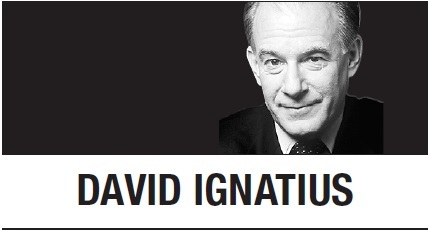[David Ignatius] State Department shift would signal more hawkish foreign policy
By Korea HeraldPublished : Dec. 3, 2017 - 17:36
 The bad marriage of President Trump and Secretary of State Rex Tillerson seems to be nearing an end, probably to the relief of both. The question is how the new national security team that appears to be coming will change American policy.
The bad marriage of President Trump and Secretary of State Rex Tillerson seems to be nearing an end, probably to the relief of both. The question is how the new national security team that appears to be coming will change American policy.Tillerson for months has been a target of bad mouthing from the White House, reflecting Trump’s feeling that the quiet, sometimes phlegmatic Tillerson was out of step with the president. The sense that Tillerson was moving from dead man walking to former secretary increased Thursday, as both the New York Times and the Washington Post reported that the White House was readying plans for a transition at State.
The centerboard of this administration’s foreign policy team will remain Secretary of Defense Jim Mattis, still steady in balancing military policy. But there will be a lot more sail aloft, adding speed and also danger. The changes will likely be seen as a signal of greater US willingness to use force, which will increase anxieties at home and abroad about possible conflict with North Korea and Iran.
Mike Pompeo, the feisty and politically ambitious CIA director who’s likely headed to State, is the un-Tillerson. He’s flamboyant where Tillerson is guarded; sharp and sometimes snarky where Tillerson is reticent. He’s a far better communicator than Tillerson, and he’ll probably do better conveying to Congress, the public and US allies his version of diplomacy than did Tillerson, whose dislike for his job was palpable.
The atmospherics will be a more activist, hawkish, extroverted US foreign policy. Pompeo is good at the things Tillerson wasn’t. And he has the president’s confidence and speaks with the tough, confident voice that Trump wants to project.
How big will the substantive policy changes be? That’s hard to predict. Mattis and Tillerson have been joined at the hip on most policy issues, especially North Korea. They presented a formidable united front in the Situation Room; the power axis may now shift a bit, because of the chemistry between Trump and Pompeo.
On North Korea policy, there will likely be continuity in the short run. Pompeo knows as well as Tillerson did that US military options are bad, and that working with allies is an essential requirement. Pompeo has been aggressively developing covert options for North Korea, but he probably agrees with Tillerson that there is no “silver bullet” for solving this problem.
Tillerson said Tuesday, after North Korea’s latest missile test: “Diplomatic options remain viable and open, for now.” That’s still the operative policy. So is Tillerson’s plan to convene in Canada a meeting of the so-called “sending states,” the 15 US allies that sent troops to fight North Korea in 1950 under a UN Security Council resolution. Mattis was the first to endorse this idea publicly, and he still backs it strongly.
North Korea boasted Wednesday that with its latest missile test, it has completed its goal of a “rocket weaponry system development.” Pyongyang may now want to talk from a position of strength. But Tillerson recently told Chinese diplomats that North Korea must “earn its way” to negotiations by moderating its actions. Obviously, that still holds, too.
The wild card in the new team is Sen. Tom Cotton, reputed to be the president’s choice to replace Pompeo as CIA director. Cotton has played an outsize policy role in recent months, especially in shaping Iran strategy. He cultivates the image of a hard man, lanky, laconic and Arkansas tough. Like Pompeo, he combines book smarts with a high tolerance for risk. Pyongyang and Tehran should be worried. This team has not been selected to manage compromise.
US allies will probably be worried, too. Tillerson was liked and trusted by key allies and seen as a check on Trump’s impulsiveness.
Cotton’s reputation at the Pentagon is that of the “smart young captain” who fought courageously in Iraq but is untested in senior command. CIA operations officers will like his reputation as a “doer”; analysts will worry that he’s too close to policymakers at the White House. Most successful CIA directors quickly learn how much they don’t know; humility is part of the job description, along with boldness.
In the early months of the Trump administration, the Mattis-Tillerson alliance led many analysts to say that the “adults” were in charge of foreign policy, and that their influence checked the tweet-happy president. Trump hated that formulation. Now he’ll have a new team, one that is tuned more closely to his pitch.
The new ascendancy of the hawks doesn’t mean conflict is ahead, necessarily. But Pyongyang and Tehran should understand that Washington is recalculating its tolerance for risk.
By David Ignatius
David Ignatius can be reached via Twitter: @IgnatiusPost. -- Ed.
(Washington Post Writers Group)
-
Articles by Korea Herald





![[Herald Interview] 'Amid aging population, Korea to invite more young professionals from overseas'](http://res.heraldm.com/phpwas/restmb_idxmake.php?idx=644&simg=/content/image/2024/04/24/20240424050844_0.jpg&u=20240424200058)












![[KH Explains] Korean shipbuilding stocks rally: Real growth or bubble?](http://res.heraldm.com/phpwas/restmb_idxmake.php?idx=652&simg=/content/image/2024/04/25/20240425050656_0.jpg&u=)

